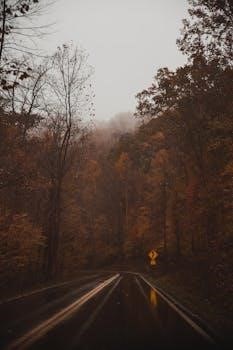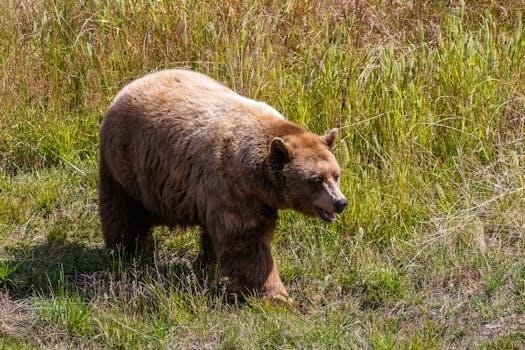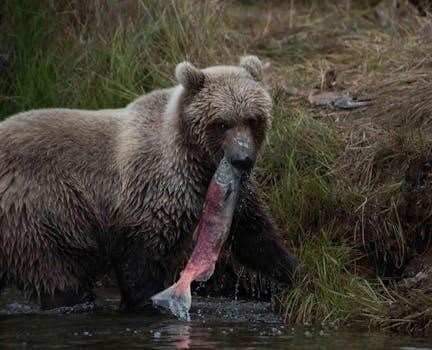
guided bear hunts in tennessee
Overview of Guided Bear Hunts in Tennessee
Tennessee offers thrilling guided black bear hunts, drawing hunters to the Appalachian Mountains․ These hunts, often with hounds, provide unique adventures with experienced guides․ Outfitters offer various hunting methods, including archery, rifle and muzzleloader options․ These experiences range from basic to all-inclusive․
Black bear hunting in Tennessee presents a unique and challenging experience for outdoor enthusiasts․ The state’s diverse landscapes, particularly the Appalachian Mountains in East Tennessee, are home to a thriving black bear population, exceeding 16,000, making it a premier destination for bear hunting in the South․ This region provides ideal habitats for bears, creating an exciting opportunity for hunters seeking a memorable pursuit․ Guided hunts offer a structured approach, with experienced professionals leading the way․ These hunts often involve various techniques, catering to different preferences and skill levels, including archery, rifle, and muzzleloader options․ The allure of a black bear hunt in Tennessee lies in the combination of abundant wildlife, scenic beauty, and the thrill of the chase, making it a highly sought-after experience for both novice and seasoned hunters․ Understanding the nuances of the local bear population and the specific hunting regulations are key elements for a successful and ethical hunt․ The presence of experienced outfitters ensures that hunters navigate these aspects effectively, maximizing the chances of a rewarding adventure․ Additionally, the history of bear hunting in the region, with its ties to Native American and early settler practices, adds a rich cultural dimension to the experience․
Popular Hunting Locations in Tennessee
Tennessee’s diverse landscape offers several prime locations for guided black bear hunts․ The eastern region, particularly the Appalachian Mountains, stands out as a hotspot․ This area, home to a significant bear population, provides the ideal habitat for these animals․ The Cherokee National Forest and the Great Smoky Mountains National Park, while the park itself is a sanctuary, the surrounding areas offer excellent hunting opportunities․ These locations boast varied terrain, from dense forests to mountainous regions, providing a challenging yet rewarding experience for hunters․ The Standing Rock Hunting Lodge, among others, is a popular choice for hunters seeking a true Tennessee experience․ These locations often feature well-maintained trails and strategically placed hunting stands, catering to various hunting styles․ The presence of lakes and streams further enhances the scenic beauty of these locations, creating an immersive outdoor experience․ Moreover, the abundance of natural forage in these areas contributes to the robust bear population, increasing the chances of a successful hunt․ Outfitters often have established territories within these regions, providing hunters with access to the best hunting spots․ The combination of abundant bear populations and scenic landscapes makes these locations a hunter’s paradise․
Types of Guided Hunts Offered (Archery, Rifle, Muzzleloader)

Guided bear hunts in Tennessee cater to diverse preferences, offering various weapon options such as archery, rifle, and muzzleloader․ Archery hunts, typically conducted during specific seasons, provide a unique challenge, requiring hunters to get within close range of their target․ These hunts often take place from tree stands or ground blinds, utilizing natural terrain for concealment․ Rifle hunts, another popular option, allow hunters to engage targets at a greater distance, often using well-maintained shooting lanes․ The use of rifles may be more suitable for hunters who prefer a more traditional approach․ Muzzleloader hunts, providing a more historical experience, also have their place, offering a different level of challenge for hunters․ These hunts usually take place during dedicated seasons and require specific equipment․ Outfitters often provide training or refresher courses on the safe use of these weapons․ Regardless of the chosen method, guided hunts typically include expert guidance, ensuring a safe and enjoyable experience․ The specific weapon choice often depends on the hunter’s skill level and personal preference․ Each of these hunting styles provides a unique way to experience the thrill of bear hunting․ Outfitters tailor their services to accommodate these varied hunting preferences․

Planning Your Guided Bear Hunt
Planning a guided bear hunt in Tennessee involves selecting a reputable outfitter, understanding state regulations, and budgeting for costs․ These steps ensure a smooth, successful, and legal hunting experience․ Research is key to a well-planned trip․
Choosing a Reputable Outfitter
Selecting a reputable outfitter is crucial for a successful and ethical guided bear hunt in Tennessee․ Look for outfitters with extensive experience in the region, particularly those with a long history of operating in the Appalachian Mountains․ Check for proper licensing and insurance, ensuring they meet all state requirements․ Client testimonials and reviews can offer valuable insight into their professionalism and hunting success rates․ It is important to avoid outfitters who advertise bargain hunts, as these often compromise quality․ A good outfitter should emphasize a complete and memorable experience, showing commitment to their client’s success․ They will work year-round to maintain the habitat and ensure stands are well-maintained․ Consider outfitters who offer private accommodations rather than shared bunkhouses․ Prioritize those with a deep understanding of bear behavior and hunting techniques․ Inquire about their guides’ experience and knowledge of the area․ A reputable outfitter will openly discuss their methods and any potential challenges, ensuring realistic expectations․
Understanding Tennessee Hunting Regulations
Navigating Tennessee’s hunting regulations is essential for a legal and responsible bear hunt․ Hunters must possess the correct licenses and permits, which can vary based on residency and hunting method․ Tennessee’s hunting seasons for bear have specific dates for archery, muzzleloader, and rifle․ Familiarize yourself with the bag limits, typically one bear per hunter per season․ Baiting regulations should be understood, as they might affect your hunting method․ It’s crucial to know the legal hunting hours and areas where hunting is permissible․ Some areas, such as wildlife management areas, may have specific restrictions․ Ensure your chosen outfitter is well-versed in these regulations and operates within the legal framework․ Always verify the current regulations with the Tennessee Wildlife Resources Agency before your hunt․ Failure to comply can lead to fines and other legal penalties․ Responsible hunting includes proper tagging and reporting of harvested animals․ Seek clarification on any rules you are unclear about to ensure compliance and ethical hunting practice․
Typical Costs and Packages
Guided bear hunts in Tennessee vary widely in cost, depending on the package․ Basic packages might include guide services and access to hunting land, while more comprehensive packages add lodging, meals, and transportation․ Expect to find options ranging from around $1,500 to upwards of $5,000, with some even higher for premium experiences․ Factors influencing price include the length of the hunt, typically ranging from 3 to 6 days, and the type of accommodation provided, from basic cabins to luxurious lodges․ Some packages offer guaranteed hunts, potentially increasing the cost․ The type of hunting method, whether archery, rifle, or muzzleloader, may also affect pricing․ Additional fees could apply for trophy preparation or extra services․ It’s important to carefully review what is included and excluded in each package to avoid unexpected costs․ Booking early often secures the best prices․ Always factor in potential gratuities for your guides․ Finally, carefully consider the value, comparing the cost with the services offered to choose a package that meets your needs and expectations․

The Guided Hunting Experience
Guided bear hunts in Tennessee offer an immersive experience․ Expect expert guidance, often with hounds, along with lodging and meals․ The hunt includes transportation to stands and may involve various hunting techniques tailored to the location and game․
What to Expect on a Guided Hunt
A guided bear hunt in Tennessee typically begins with an orientation to the hunting area and applicable regulations․ Expect your guide to be knowledgeable about local bear behavior and habitats, and to have meticulously maintained hunting properties with limited hunting pressure․ You’ll be transported to established bait sites or hunting stands, often using ATVs, trucks, or boats․ The guide will advise on hunting techniques, such as still hunting, tracking, or stand placement․ Many hunts include the use of hounds for tracking and treeing bears, if that is the hunter’s preference․ You can anticipate early mornings and late evenings in the field, with periods of waiting and observation․ The guide will assist with field dressing if your hunt is successful and will often offer advice on care of meat and hides․ It’s essential to communicate with your guide and follow their directions for safety and a successful hunt․ They’ll also aim to provide a memorable experience with a focus on fair chase and ethical hunting․
Lodging and Accommodation Options
Guided bear hunts in Tennessee often include various lodging options, ranging from rustic cabins to fully furnished lodges․ Some outfitters offer accommodations right next to beautiful lakes, providing a tranquil setting․ Many lodges provide private rooms, ensuring a good night’s sleep, rather than bunkhouse style arrangements․ These lodgings might include amenities like comfortable beds, private bathrooms, and common areas for relaxation․ Meals are frequently included, often featuring home-style cooking with a southern flair․ Some packages offer additional perks, such as access to fishing or other recreational activities when not hunting․ Depending on the outfitter, you might find lodgings that are secluded and quiet or close to local towns․ It is important to confirm what amenities are provided when booking your hunt package․ The goal is to provide a comfortable and convenient base of operations for your Tennessee bear hunting adventure and to provide a relaxing and inviting atmosphere for your stay․
Common Hunting Techniques and Strategies
Guided bear hunts in Tennessee utilize several common techniques and strategies to maximize hunter success․ One popular method involves hunting over bait sites, where bears are attracted using various food sources․ Guides carefully maintain these sites, ensuring they are productive and attracting the bear․ Another approach is still hunting, where hunters move slowly and quietly through the woods, looking for bear activity․ Some outfitters use hounds to track and tree bears, a traditional Appalachian hunting practice․ The use of tree stands and ground blinds is also frequent, offering hunters a vantage point for spotting bears․ Guides provide their expertise in bear behavior, helping hunters choose the best methods․ They also advise on optimal shooting distances and shot placement․ They may transport hunters by ATV, boat, or canoe to different hunting locations․

Additional Considerations
When planning a guided bear hunt in Tennessee, it is important to consider equipment, seasonal dates, and success rates․ Hunters must bring proper gear, check legal hunting dates, and understand that success is not guaranteed․
Equipment and Gear Recommendations
Preparing for a guided bear hunt in Tennessee requires careful consideration of your equipment and gear․ Firstly, a reliable rifle, muzzleloader, or bow, depending on your chosen method, is essential, along with appropriate ammunition or arrows․ A high-quality scope or sight is also recommended for accurate shots․ Proper hunting clothing, suitable for the varied weather conditions in Tennessee, should include layers of moisture-wicking material, a durable outer shell, and comfortable, waterproof boots․ A hunting backpack is useful for carrying essentials, such as water, snacks, a first-aid kit, and a knife․ Additionally, a rangefinder, binoculars, and a compass or GPS device can be beneficial for navigation and locating bears․ Don’t forget to pack a headlamp or flashlight with extra batteries for low-light conditions․ Personal items, like sunscreen, insect repellent, and toiletries, should also be included․ Finally, a camera to document your experience is always a great idea․ Ensure all equipment is in good working order before the hunt․
Seasonal Hunting Dates
Tennessee’s bear hunting seasons are carefully regulated, with specific dates for different hunting methods and regions․ Generally, there are two main bear hunting seasons⁚ spring and fall․ The spring bear hunt typically occurs in late May and early June, while the fall season usually takes place in September․ These dates can vary slightly each year, so it’s crucial to consult the Tennessee Wildlife Resources Agency (TWRA) regulations for the most up-to-date information․ Within these seasons, specific dates might differ for archery, rifle, and muzzleloader hunting․ Archery season often opens earlier than the rifle season, providing more hunting opportunities․ Muzzleloader season is usually a shorter period that falls between the archery and rifle seasons․ It’s also important to be aware of any zone-specific regulations and restrictions that may apply․ Always verify the exact dates before planning your guided bear hunt to ensure compliance and a successful trip․
Success Rates and Hunter Expectations
Success rates for guided bear hunts in Tennessee can vary depending on several factors, including the outfitter’s expertise, the hunting location, and the hunter’s skill level․ While some outfitters boast high success rates, it’s essential to understand that bear hunting can be challenging․ Hunters should approach their guided trip with realistic expectations․ It’s not always guaranteed that a bear will be harvested, even with an experienced guide․ The success of a hunt often depends on weather conditions, bear movement patterns, and the hunter’s ability to follow the guide’s instructions․ Outfitters work hard to provide opportunities, but bears are wild animals, and their behavior can be unpredictable․ A successful hunt is not only about harvesting a bear but also about the experience, enjoying the natural environment, and learning about bear behavior․ Hunters should focus on having a memorable adventure and respect the process․

